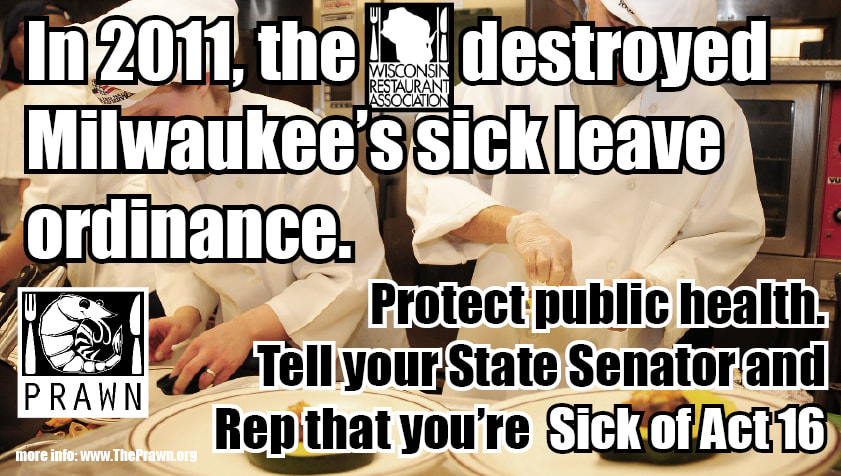Advocacy.Not all restaurants are driven by short-term profits and disdain for the employees who they profit from. Our advocacy on the municipal and state levels is focused on assisting Wisconsin's restaurants and bars in making conditions better for their employees.
|
All VolunteerWe believe in our mission. Unlike the deep-pocketed Wisconsin Restaurant Association, our advocates are all volunteers, not paid lobbyists. That means that even our restaurant members pay dues of $0. We will be soliciting donations in the future to expand our efforts, but for now we ask only that you contribute your opinion and effort.
|
Our GoalsTo improve conditions for restaurant employees and their families in Wisconsin, our goals are:
|
The Issues
Legislation good for employees is also good for individual restaurants, as well as the industry as a whole. Although the WRA (and their national cohort, the National Restaurant Association) would have you believe that the interests of employees and restaurant operators are in conflict, that couldn't be further from the truth. We advocate for common-sense legislation and policies which benefit both restaurant employees and ethical employers.
Current legislation:
One Fair Wage employer assistance in Wisconsin prior sessions (AB 483 and SB 426), proposed again in 2021
The history: Wisconsin remains one of the states which has a sub-minimum wage for tipped employees - only $2.33 an hour. Employers are able to assume that their tipped staff will make up the difference with their tips, and that they will go home with at least minimum wage. Although this (usually) happens, the reliance on tips to make ends meet can be problematic, and huge gaps exist between a few servers at the top and many more who rely on public assistance to make ends meet.
This legislation: This legislation will return collected sales tax back to restaurants and bars who agree to pay all of their employees - tipped and untipped - at least the Wisconsin minimum wage (currently $7.25/hr). Although this won't cover the entire cost of paying employees a full minimum wage, it will help to slightly even the playing field for those who do.
Our position: PRAWN supports this legislation. The data is clear: states which have eliminated the sub-minimum wage for tipped employees have happier, more stable employees. More employees are kept off of public assistance, which is a win for individuals across the board, and the restaurants themselves are even more successful: the restaurant industry in these states are outpacing our own. Since our legislators in Madison have refused to allow raises to the minimum wage at a statewide or municipal level, though, employers who would choose to raise their wages for tipped employees from from $2.33 an hour to $7.25 are put at a competitive disadvantage; most simply can't afford to do so. We know that many Wisconsin employers want to do the right thing for their employees and to guarantee them a more stable, living income. The last spending bill in Congress affirmed that tips are the property of employees, and allows restaurants and bars to establish employee-only tip pools, which when combined with this legislation, will raise wages for both FOH employees (like servers) and BOH employees (like kitchen staff), leading to better outcomes for all employees, the restaurants in which they work, and only minimal increases to consumer prices (which, even according to the National Restaurant Association's own leaked research, the public supports). This legislation evens the playing field for restaurants who want to do the right thing.
The social and fiscal impact of this legislation will be positive, since employees will need less public assistance from the state, and because employees taking home more money will re-invest those dollars in their communities.
Allowing takeout (and potential delivery) of restaurant/bar sealed alcoholic beverages - proposed again in 2021
The history: This legislation was originally proposed and authored by Senator Chris Larson. Although defeated in 2020, it's now been proposed by Republicans and seems to have bi-partisan support.
This legislation: This legislation would modify Chapter 125 to remove the requirement that bars and restaurants only be able to serve beer, wine and cocktails only in their original, sealed containers, allowing carryout cocktails with a tamper-evident seal affixed by the venue. Wisconsin is one of fewer than 20 states which still do not allow this practice.
Our position: We are in favor of this legislation, just as we were in 2020 and prior. Although it's now overdue, and would have been a lifeline to many restaurants during the early days of the pandemic, when the Wisconsin Restaurant Association refused to support it, it's still a welcome boost to revenues for restaurants and bars (and our employees) who have been hard hit by the pandemic. It allows the many restaurants and bars who have chosen to prioritize public health by offering only delivery and carryout an additional revenue stream in the absence of robust or adequate federal and state assistance. It also makes the responsible decision to close in-person dining slightly more viable. We are in favor of further amendments or additional bills that would allow delivery as well as the carryout exemption in the draft version.
Entrenching Sub-Minimum Wage Tip Credits (SB-50) - proposed again in 2021
The history: It's unclear why this legislation was proposed, as no industry groups (or servers) were calling for it prior to it having been authored and circulated. Currently, employers who pay sub-minimum wages as low as $2.33 an hour are able to count an employee's tips towards the minimum wage, and employers who practice this should obtain a signed tip declaration from tipped employees being directly paid less than $7.50/hr certifying that they made at least minimum wage when tips were factored in.
This legislation: This legislation would change the law to remove the requirement for a signature from employees making a sub-minimum wage, allowing for this process to be automated.
Our position: We are opposed to this legislation. PRAWN reached out to our member restaurants and bars, and other restaurants and bars across Wisconsin, and found zero of them concerned about the protections afforded by the current process. Although the call for co-sponsorship for this legislation claims that "restaurants have become the targets of frivolous lawsuits" because of unsigned tip declarations, we have been unable to find any coverage of incidents of this, even anecdotally. Several of our members expressed concern that a digital system could be easier to abuse, noting stories of employers who, even with the current system, ask employees to falsely certify that they made more in tips than they did to avoid having to pay the difference, and are concerned that a digital system would provide even less protection. Many members expressed frustration that this legislation seems to streamline the process of tip credits (and the $2.33 sub-minimum wage), and distracts from measures like last session's AB 423 / SB 426 (2020), which would enable employers to avoid claiming the tip credit altogether, and would raise many working families in Wisconsin out of poverty.
One Fair Wage employer assistance in Wisconsin prior sessions (AB 483 and SB 426), proposed again in 2021
The history: Wisconsin remains one of the states which has a sub-minimum wage for tipped employees - only $2.33 an hour. Employers are able to assume that their tipped staff will make up the difference with their tips, and that they will go home with at least minimum wage. Although this (usually) happens, the reliance on tips to make ends meet can be problematic, and huge gaps exist between a few servers at the top and many more who rely on public assistance to make ends meet.
This legislation: This legislation will return collected sales tax back to restaurants and bars who agree to pay all of their employees - tipped and untipped - at least the Wisconsin minimum wage (currently $7.25/hr). Although this won't cover the entire cost of paying employees a full minimum wage, it will help to slightly even the playing field for those who do.
Our position: PRAWN supports this legislation. The data is clear: states which have eliminated the sub-minimum wage for tipped employees have happier, more stable employees. More employees are kept off of public assistance, which is a win for individuals across the board, and the restaurants themselves are even more successful: the restaurant industry in these states are outpacing our own. Since our legislators in Madison have refused to allow raises to the minimum wage at a statewide or municipal level, though, employers who would choose to raise their wages for tipped employees from from $2.33 an hour to $7.25 are put at a competitive disadvantage; most simply can't afford to do so. We know that many Wisconsin employers want to do the right thing for their employees and to guarantee them a more stable, living income. The last spending bill in Congress affirmed that tips are the property of employees, and allows restaurants and bars to establish employee-only tip pools, which when combined with this legislation, will raise wages for both FOH employees (like servers) and BOH employees (like kitchen staff), leading to better outcomes for all employees, the restaurants in which they work, and only minimal increases to consumer prices (which, even according to the National Restaurant Association's own leaked research, the public supports). This legislation evens the playing field for restaurants who want to do the right thing.
The social and fiscal impact of this legislation will be positive, since employees will need less public assistance from the state, and because employees taking home more money will re-invest those dollars in their communities.
Allowing takeout (and potential delivery) of restaurant/bar sealed alcoholic beverages - proposed again in 2021
The history: This legislation was originally proposed and authored by Senator Chris Larson. Although defeated in 2020, it's now been proposed by Republicans and seems to have bi-partisan support.
This legislation: This legislation would modify Chapter 125 to remove the requirement that bars and restaurants only be able to serve beer, wine and cocktails only in their original, sealed containers, allowing carryout cocktails with a tamper-evident seal affixed by the venue. Wisconsin is one of fewer than 20 states which still do not allow this practice.
Our position: We are in favor of this legislation, just as we were in 2020 and prior. Although it's now overdue, and would have been a lifeline to many restaurants during the early days of the pandemic, when the Wisconsin Restaurant Association refused to support it, it's still a welcome boost to revenues for restaurants and bars (and our employees) who have been hard hit by the pandemic. It allows the many restaurants and bars who have chosen to prioritize public health by offering only delivery and carryout an additional revenue stream in the absence of robust or adequate federal and state assistance. It also makes the responsible decision to close in-person dining slightly more viable. We are in favor of further amendments or additional bills that would allow delivery as well as the carryout exemption in the draft version.
Entrenching Sub-Minimum Wage Tip Credits (SB-50) - proposed again in 2021
The history: It's unclear why this legislation was proposed, as no industry groups (or servers) were calling for it prior to it having been authored and circulated. Currently, employers who pay sub-minimum wages as low as $2.33 an hour are able to count an employee's tips towards the minimum wage, and employers who practice this should obtain a signed tip declaration from tipped employees being directly paid less than $7.50/hr certifying that they made at least minimum wage when tips were factored in.
This legislation: This legislation would change the law to remove the requirement for a signature from employees making a sub-minimum wage, allowing for this process to be automated.
Our position: We are opposed to this legislation. PRAWN reached out to our member restaurants and bars, and other restaurants and bars across Wisconsin, and found zero of them concerned about the protections afforded by the current process. Although the call for co-sponsorship for this legislation claims that "restaurants have become the targets of frivolous lawsuits" because of unsigned tip declarations, we have been unable to find any coverage of incidents of this, even anecdotally. Several of our members expressed concern that a digital system could be easier to abuse, noting stories of employers who, even with the current system, ask employees to falsely certify that they made more in tips than they did to avoid having to pay the difference, and are concerned that a digital system would provide even less protection. Many members expressed frustration that this legislation seems to streamline the process of tip credits (and the $2.33 sub-minimum wage), and distracts from measures like last session's AB 423 / SB 426 (2020), which would enable employers to avoid claiming the tip credit altogether, and would raise many working families in Wisconsin out of poverty.

Recent legislation:
Repeal Act 16 / AB 927 / SB 833: Allow sick leave legislation
The history: In 2008, Milwaukee passed an ordinance which would have given employees paid time off (roughly 9 days for someone working 40 hours a week). It was the right thing to do, and protected both service industry employees as well as the public, since nobody wants the people who make and serve food to have to choose between paying their bills and coming to work. It also evened the playing field for employers, since it wasn't just left to the responsible ones to foot the bill for time off.
Unfortunately, the Wisconsin Restaurant Association immediately lobbied their state legislators, who passed Act 16, striking down Milwaukee County's ordinance - and others across the state - so that employees were denied uniform sick leave and public health was placed in jeopardy. Act 16 became model legislation for other states, who copied it, struck down their own city and county ordinances, and facilitated the spread of threats to public health like COVID-19
Our ask: Call on your state legislators to support AB 927, repealing Act 16, so that Milwaukee (and other cities and counties) can finally provide paid time off for employees and protections for public health in the time of COVID-19. Let them know that sick time is both the right thing for employees and for public health, and that we're sick of Act 16.
Raising the minimum wage (AB 961) and restoring local control for minimum wages (AB 928)
The history: Wisconsin has pre-empted the ability of local governments to set higher-than-federal minimum wages, and has kept the state minimum wage at only $7.25/hr
This legislation: This legislation would both gradually raise the minimum wage, remove the exception for "tip credits" (which allow employers in Wisconsin to pay as little as $2.33/hr), and removes the preemption against municipal governments raising their own minimum wages.
Our position: We support this legislation. Although unlikely to pass, as it is divided upon partisan lines, we clearly need both to abolish the tip credit and to raise the minimum wage. This ramps up over a reasonable period, and will ensure that the playing field is level for employers wanting to do the right thing for their employees.
Tax Free Cash Tips in Wisconsin
The history: It's unclear why this legislation was proposed, as no industry groups (or servers) were calling for it prior to it having been authored and circulated.
This legislation: This legislation would exempt cash tips (and only cash tips) from Wisconsin state income tax.
Our position: PRAWN opposes this legislation, but would support it in conjunction with more substantial legislation (such as AB 483 / SB 426 above). The effect of this by itself is negligible, given that most servers pay 4% state sales tax, and only take in a small percentage of their total tips in cash. If the WRA's suggestion that many servers are not declaring their tips is accurate, then declaring those tips would actually cost a typical server more overall, since federal taxes are likely higher than Wisconsin's.
This seems to be a merely symbolic measure, designed for political, rather than fiscal, impact. At best, it'll put only a few dollars into the pockets of servers in Wisconsin. When we asked the bill sponsors what the motivation was behind this legislation, they noted that they wanted to help servers in Wisconsin, but none has yet signed on to LRB-1760, which would have a far more substantial effect. PRAWN calls on Wisconsin lawmakers who want to make a substantial impact to also support LRB-1760.
Repeal Act 16 / AB 927 / SB 833: Allow sick leave legislation
The history: In 2008, Milwaukee passed an ordinance which would have given employees paid time off (roughly 9 days for someone working 40 hours a week). It was the right thing to do, and protected both service industry employees as well as the public, since nobody wants the people who make and serve food to have to choose between paying their bills and coming to work. It also evened the playing field for employers, since it wasn't just left to the responsible ones to foot the bill for time off.
Unfortunately, the Wisconsin Restaurant Association immediately lobbied their state legislators, who passed Act 16, striking down Milwaukee County's ordinance - and others across the state - so that employees were denied uniform sick leave and public health was placed in jeopardy. Act 16 became model legislation for other states, who copied it, struck down their own city and county ordinances, and facilitated the spread of threats to public health like COVID-19
Our ask: Call on your state legislators to support AB 927, repealing Act 16, so that Milwaukee (and other cities and counties) can finally provide paid time off for employees and protections for public health in the time of COVID-19. Let them know that sick time is both the right thing for employees and for public health, and that we're sick of Act 16.
Raising the minimum wage (AB 961) and restoring local control for minimum wages (AB 928)
The history: Wisconsin has pre-empted the ability of local governments to set higher-than-federal minimum wages, and has kept the state minimum wage at only $7.25/hr
This legislation: This legislation would both gradually raise the minimum wage, remove the exception for "tip credits" (which allow employers in Wisconsin to pay as little as $2.33/hr), and removes the preemption against municipal governments raising their own minimum wages.
Our position: We support this legislation. Although unlikely to pass, as it is divided upon partisan lines, we clearly need both to abolish the tip credit and to raise the minimum wage. This ramps up over a reasonable period, and will ensure that the playing field is level for employers wanting to do the right thing for their employees.
Tax Free Cash Tips in Wisconsin
The history: It's unclear why this legislation was proposed, as no industry groups (or servers) were calling for it prior to it having been authored and circulated.
This legislation: This legislation would exempt cash tips (and only cash tips) from Wisconsin state income tax.
Our position: PRAWN opposes this legislation, but would support it in conjunction with more substantial legislation (such as AB 483 / SB 426 above). The effect of this by itself is negligible, given that most servers pay 4% state sales tax, and only take in a small percentage of their total tips in cash. If the WRA's suggestion that many servers are not declaring their tips is accurate, then declaring those tips would actually cost a typical server more overall, since federal taxes are likely higher than Wisconsin's.
This seems to be a merely symbolic measure, designed for political, rather than fiscal, impact. At best, it'll put only a few dollars into the pockets of servers in Wisconsin. When we asked the bill sponsors what the motivation was behind this legislation, they noted that they wanted to help servers in Wisconsin, but none has yet signed on to LRB-1760, which would have a far more substantial effect. PRAWN calls on Wisconsin lawmakers who want to make a substantial impact to also support LRB-1760.

Prior Legislation:
Proposed changes to ATCP 75 (letter grades for restaurants) :
The history: The City of Milwaukee Health Department recently switched from an opaque inspection system to a letter-grade based one in which restaurants are assigned a letter grade (A through C) which is publicly displayed. This move was championed by consumer advocates as a clear and easy-to-understand method which studies have found effective in other markets (such as New York) in reducing food-borne illness. Even the WRA's own talking points acknowledge that the public is strongly in favor of it, and such policies enjoy a more than 80% approval rating.
This legislation: Inexplicably, the Wisconsin Restaurant Association is opposed to letter grades for restaurants, and is advocating changes to the Wisconsin Department of Agriculture Trade and Consumer Protection's policies outlawing them . The WRA's actual position is that consumers are too stupid to understand letter grades, and that a restaurants could have "one bad day" and get a failing grade. Neither of these is factual. As noted on the Health Department's website, the grades are an average of the three most recent report cards, not a snapshot of a single incident. Indeed, in order to even move from an "A" to a "B" rating, a restaurant would have to have five violations in the most serious category and then take no significant actions to correct most of them upon several re-inspections.
Our position: The public has a great deal of faith in Wisconsin's dining establishments: and with good reason. The vast majority of them are safe, and the owners take pride in the conditions in which food is kept and stored. Any organization which claims to speak for restaurant owners should be embracing, not outlawing, systems which make inspection information readily available to the public. The WRA's position against a widely popular (and statistically effective) grading system has the potential to erode the public's faith in Wisconsin's best restaurants. PRAWN is against any legislation banning letter grades for restaurants.
Proposed changes to ATCP 75 (letter grades for restaurants) :
The history: The City of Milwaukee Health Department recently switched from an opaque inspection system to a letter-grade based one in which restaurants are assigned a letter grade (A through C) which is publicly displayed. This move was championed by consumer advocates as a clear and easy-to-understand method which studies have found effective in other markets (such as New York) in reducing food-borne illness. Even the WRA's own talking points acknowledge that the public is strongly in favor of it, and such policies enjoy a more than 80% approval rating.
This legislation: Inexplicably, the Wisconsin Restaurant Association is opposed to letter grades for restaurants, and is advocating changes to the Wisconsin Department of Agriculture Trade and Consumer Protection's policies outlawing them . The WRA's actual position is that consumers are too stupid to understand letter grades, and that a restaurants could have "one bad day" and get a failing grade. Neither of these is factual. As noted on the Health Department's website, the grades are an average of the three most recent report cards, not a snapshot of a single incident. Indeed, in order to even move from an "A" to a "B" rating, a restaurant would have to have five violations in the most serious category and then take no significant actions to correct most of them upon several re-inspections.
Our position: The public has a great deal of faith in Wisconsin's dining establishments: and with good reason. The vast majority of them are safe, and the owners take pride in the conditions in which food is kept and stored. Any organization which claims to speak for restaurant owners should be embracing, not outlawing, systems which make inspection information readily available to the public. The WRA's position against a widely popular (and statistically effective) grading system has the potential to erode the public's faith in Wisconsin's best restaurants. PRAWN is against any legislation banning letter grades for restaurants.
Legislation to protect Dreamers:
Setting aside the obvious arguments about the basic human worth of people who have been in Wisconsin since their childhoods, many Dreamers are employed by the restaurant industry. Inexplicably, both the WRA and the National Restaurant Association have been almost entirely silent when faced with the deportation of hundreds of thousands of our employees (and neighbors and friends). This silence, especially from an organization which pretends to speak for restaurants, raises troubling concerns that the WRA and NRA exist not to protect restaurants, but to repress their employees when they are most in need of advocacy and protection. PRAWN is in favor of both immediate and long-term protections for Dreamers as well as other immigrants.
Setting aside the obvious arguments about the basic human worth of people who have been in Wisconsin since their childhoods, many Dreamers are employed by the restaurant industry. Inexplicably, both the WRA and the National Restaurant Association have been almost entirely silent when faced with the deportation of hundreds of thousands of our employees (and neighbors and friends). This silence, especially from an organization which pretends to speak for restaurants, raises troubling concerns that the WRA and NRA exist not to protect restaurants, but to repress their employees when they are most in need of advocacy and protection. PRAWN is in favor of both immediate and long-term protections for Dreamers as well as other immigrants.
Previous legislation:
AB 748 / SB 634: Employment Law Standardization Act
The history: The WRA and their legislators in Madison have already passed legislation preventing local municipalities from providing higher minimum wages (2005) or moderate increases in working conditions. In 2011, Milwaukee passed a law requiring that employers give their employees up to nine days of paid time off when they fall ill. For ethical employers, such legislation made sense because it put all of Milwaukee's employers on an even playing field, making good employers who were already offering paid time off more competitive. In response, the WRA passed legislation preempting the ability of local governments to require employers to give paid time off, effectively penalizing restaurateurs who care for their employees (and the public) enough for them to not want to work with food when they are too sick to work, and to have to choose between making ends meet and not exposing their customers to risks of infection. When the WRA attacks common-sense measures like this, it erodes the public's confidence in our whole industry.
This legislation: The WRA has already gone after paid time off and higher minimum wages. Although this bill is framed as a narrow attack on "fair scheduling" (as proposed by Rep. Hebl of Sun Prarie) and a benign attempt at "standardization" the legislation as written is far more broad (and nefarious). It doesn't only preempt local scheduling laws, but also labor peace agreements, protected classes (including vital protections for transgender, homeless and other employees), prohibitions on employer's right to compel an applicant to disclose prior wage histories, which professions are regulated by the state, overtime, and more.
Our position: PRAWN is opposed to this legislation. In the absence of successful national or statewide efforts, it is vital that local government units retain the right to lift their residents into the middle class and economic stability. Common-sense municipal measures should be supported by ethical restaurant operators who are no longer at an economic disadvantage compared to their peers who don't offer enhanced protections for their employees, so there is no substantial negative impact day-to-day. Since employees who are more secure in their jobs have less turnover and work more productively, the overall impact on both restaurants and their employees is positive. Taking away the ability of local governments to enact employee-positive laws would be a huge step backwards, and would have an even more negative effect on our most vulnerable employees.
Update: Although this legislation passed, due to our advocacy (and that of the WI LGBT Chamber of Commerce, among others) the provisions which would allow termination of transgender employees were stripped from it.
AB 748 / SB 634: Employment Law Standardization Act
The history: The WRA and their legislators in Madison have already passed legislation preventing local municipalities from providing higher minimum wages (2005) or moderate increases in working conditions. In 2011, Milwaukee passed a law requiring that employers give their employees up to nine days of paid time off when they fall ill. For ethical employers, such legislation made sense because it put all of Milwaukee's employers on an even playing field, making good employers who were already offering paid time off more competitive. In response, the WRA passed legislation preempting the ability of local governments to require employers to give paid time off, effectively penalizing restaurateurs who care for their employees (and the public) enough for them to not want to work with food when they are too sick to work, and to have to choose between making ends meet and not exposing their customers to risks of infection. When the WRA attacks common-sense measures like this, it erodes the public's confidence in our whole industry.
This legislation: The WRA has already gone after paid time off and higher minimum wages. Although this bill is framed as a narrow attack on "fair scheduling" (as proposed by Rep. Hebl of Sun Prarie) and a benign attempt at "standardization" the legislation as written is far more broad (and nefarious). It doesn't only preempt local scheduling laws, but also labor peace agreements, protected classes (including vital protections for transgender, homeless and other employees), prohibitions on employer's right to compel an applicant to disclose prior wage histories, which professions are regulated by the state, overtime, and more.
Our position: PRAWN is opposed to this legislation. In the absence of successful national or statewide efforts, it is vital that local government units retain the right to lift their residents into the middle class and economic stability. Common-sense municipal measures should be supported by ethical restaurant operators who are no longer at an economic disadvantage compared to their peers who don't offer enhanced protections for their employees, so there is no substantial negative impact day-to-day. Since employees who are more secure in their jobs have less turnover and work more productively, the overall impact on both restaurants and their employees is positive. Taking away the ability of local governments to enact employee-positive laws would be a huge step backwards, and would have an even more negative effect on our most vulnerable employees.
Update: Although this legislation passed, due to our advocacy (and that of the WI LGBT Chamber of Commerce, among others) the provisions which would allow termination of transgender employees were stripped from it.
Our Team
Melissa Buchholz
|
Ryan Clancy (right)
|
Dan Jacobs
|
And You!You can support our work (and the restaurants who advocate for their employees) by signing on to our pledge here, and by asking your favorite restaurants to drop the WRA and join us. Thank you for your efforts!
|






